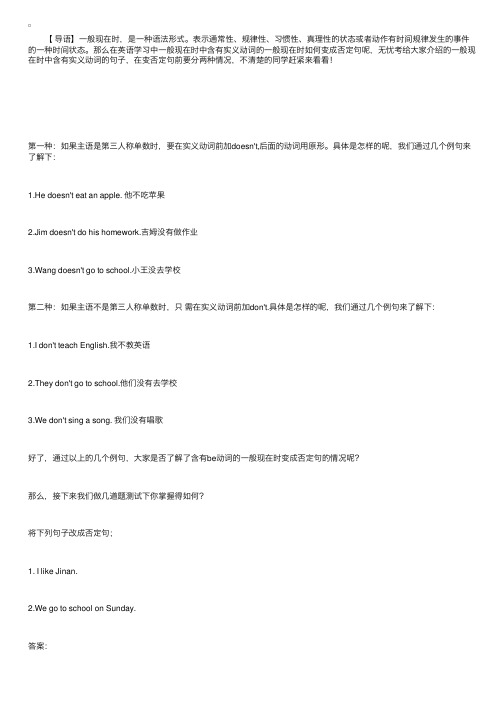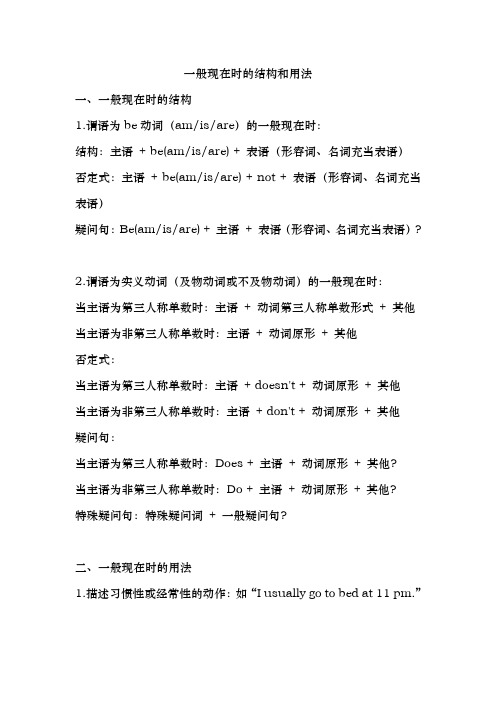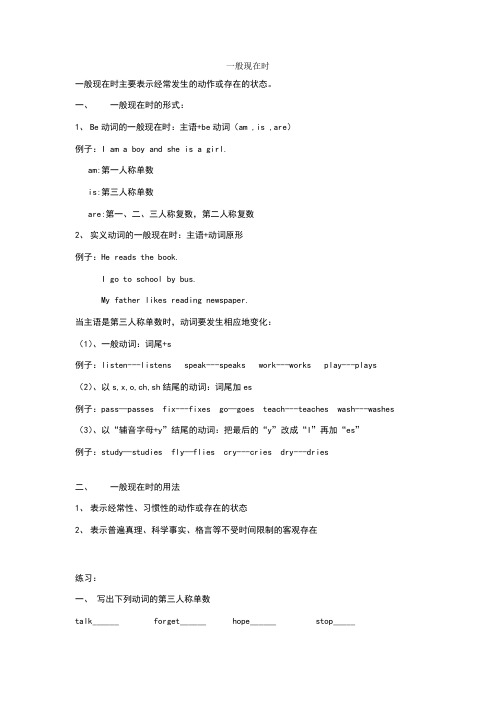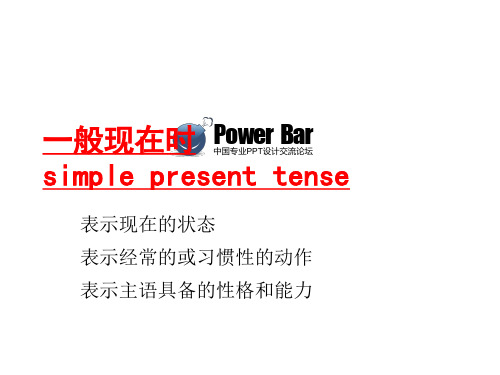实义动词的一般现在时
英语语法:含有实义动词的一般现在时如何变成否定句

【导语】⼀般现在时,是⼀种语法形式。
表⽰通常性、规律性、习惯性、真理性的状态或者动作有时间规律发⽣的事件的⼀种时间状态。
那么在英语学习中⼀般现在时中含有实义动词的⼀般现在时如何变成否定句呢,⽆忧考给⼤家介绍的⼀般现在时中含有实义动词的句⼦,在变否定句前要分两种情况,不清楚的同学赶紧来看看!
第⼀种:如果主语是第三⼈称单数时,要在实义动词前加doesn't,后⾯的动词⽤原形。
具体是怎样的呢,我们通过⼏个例句来了解下:
1.He doesn't eat an apple. 他不吃苹果
2.Jim doesn't do his homework.吉姆没有做作业
3.Wang doesn't go to school.⼩王没去学校
第⼆种:如果主语不是第三⼈称单数时,只需在实义动词前加don't.具体是怎样的呢,我们通过⼏个例句来了解下:
1.I don't teach English.我不教英语
2.They don't go to school.他们没有去学校
3.We don't sing a song. 我们没有唱歌
好了,通过以上的⼏个例句,⼤家是否了解了含有be动词的⼀般现在时变成否定句的情况呢?
那么,接下来我们做⼏道题测试下你掌握得如何?
将下列句⼦改成否定句;
1. I like Jinan.
2.We go to school on Sunday.
答案:
1. I don't like Jinan.
2.We don't go to school on Sunday.。
实义动词一般现在时

06
练习与巩固
选择题
• 选择题1:He ___a book every day.
选择题
reads is reading
has read
选择题
reads
选择题2:She _______ English in this school since 2018.
选择题
teaches
has taught
它通常用于描述习惯、事实、真 理或当前情境。
学习目标
掌握实义动词一般现 在时的基本用法。
能够在实际语境中正 确运用实义动词一般 现在时。
理解该时态的构成和 变化规则。
02
实义动词一般现在时的定义
定义
实义动词一般现在时是英语语法中的 一种时态,表示现在时间发生的动作 或存在的状态。
它通常用于描述习惯性、经常性或当 前发生的动作或状态,以及客观事实 和普遍真理。
详细描述
在英语中,实义动词的一般现在时可以用来描述一种习惯或经常发生的动作。例如,“I eat breakfast every morning”表示“我每天早上都吃早餐”。这种时态常用于描述日常习惯、规律性 活动或频繁发生的动作。
表示目前的状态或特征
总结词
描述当前存在的状态或特征。
详细描述
实义动词的一般现在时也可以用来描述目前的状态或特征。例如,“She is a student”表示“她是一名学生”。这种用法常用于描述身份、职位、性格特点 等当前状态或特征。
特点
与其他时态相比,一般现在时的动词形式较 为简单,只有第三人称单数主语需要加-s/es。
一般现在时可以与频度副词(如always, usually, often等)连用,表示动作发生的频 率。
一般现在时的结构和用法

一般现在时的结构和用法
一、一般现在时的结构
1.谓语为be动词(am/is/are)的一般现在时:
结构:主语+ be(am/is/are) + 表语(形容词、名词充当表语)
否定式:主语+ be(am/is/are) + not + 表语(形容词、名词充当表语)
疑问句:Be(am/is/are) + 主语+ 表语(形容词、名词充当表语)?
2.谓语为实义动词(及物动词或不及物动词)的一般现在时:
当主语为第三人称单数时:主语+ 动词第三人称单数形式+ 其他当主语为非第三人称单数时:主语+ 动词原形+ 其他
否定式:
当主语为第三人称单数时:主语+ doesn't + 动词原形+ 其他
当主语为非第三人称单数时:主语+ don't + 动词原形+ 其他
疑问句:
当主语为第三人称单数时:Does + 主语+ 动词原形+ 其他?
当主语为非第三人称单数时:Do + 主语+ 动词原形+ 其他?
特殊疑问句:特殊疑问词+ 一般疑问句?
二、一般现在时的用法
1.描述习惯性或经常性的动作:如“I usually go to bed at 11 pm.”
2.表达客观事实或普遍真理:如“The sun rises in the east.”
3.描述时间表或日程安排:如“The train leaves at 8 am.”
4.在新闻报道或科技文章中描述当前状况:如“The company is developing a new product.”。
一般现在时

一般现在时一般现在时主要表示经常发生的动作或存在的状态。
一、一般现在时的形式:1、Be动词的一般现在时:主语+be动词(am ,is ,are)例子:I am a boy and she is a girl.am:第一人称单数is:第三人称单数are:第一、二、三人称复数,第二人称复数2、实义动词的一般现在时:主语+动词原形例子:He reads the book.I go to school by bus.My father likes reading newspaper.当主语是第三人称单数时,动词要发生相应地变化:(1)、一般动词:词尾+s例子:listen---listens speak---speaks work---works play---plays (2)、以s,x,o,ch,sh结尾的动词:词尾加es例子:pass—passes fix---fixes go—goes teach---teaches wash---washes (3)、以“辅音字母+y”结尾的动词:把最后的“y”改成“I”再加“es”例子:study—studies fly—flies cry---cries dry---dries二、一般现在时的用法1、表示经常性、习惯性的动作或存在的状态2、表示普遍真理、科学事实、格言等不受时间限制的客观存在练习:一、写出下列动词的第三人称单数talk______ forget______ hope______ stop_____perform______ play______ say______ buy______ worry______ fly______ study_______ like_______ make______ take______love_______ recite_______ become_______ come_______ drive_______ shine_______leave_____ wake_______ ride_______ write_______ hike______give______ see______ swim______ stop______ shop_______ plan______ get______ sit_______ let_______ cut_______run_______ forget_______ begin_______ wash_____ watch_______ finish______ teach_____ fish_______ reach_______ go_______ do_____二、用括号内动词的适当形式填空。
实义动词的词形变化

实义动词的词形变化一.原形(do)1.一般现在时(用于非单数第三人称)例如 We know him.2.情态动词后例如 I can swim.3.助动词后例如 She doesn’t like swimming.Does she like eggs ?4.祈使句首例如 Stand up ,please.5.固定句型例如 Let me watch TV.二.单数第三人称(does)1.一般现在时。
(he ,she ,it 或它们代替的词)例如 He has a cat .She enjoys watching TV.I t often rains .This desk has four legs .2.表示猜测Who knows the answer ?三.不定式(to do)1句型want to do sthwould like to do sthdecide to do sthit is time to do sthask sb to do sthtell sb to do sth2两个动作之间例如 I can come to see you.四.现在分词(doing)用于现在进行时中例如 She is watching TV.五.动名词(doing)1.标题:Unite 8 Playing games.2.作主语:Running is good for you.3.介词后:I want some water after running.4.固定句型:She enjoys watching TV.。
实义动词的一般现在时

• 当主语为第三人称单数时,用助动词does
构成否定。其余用Po助w动er词Badro构成否定
中国专业PPT设计交流论坛
Model 1: I like fish. I don’t like fish.
Powerd. I don’t like red.
The moon goes around the earth.
一般现在时的构成
一、系动词中P国ob专w业ePPe的T设r计一交B流a论般r坛 现在时
二、实义动词的一般现在时
实义动词的一般现在时
• 肯定句的构成
主语 + 实义动词 + 其他
These boys Pliokweer Baprlaying football.
6. She has a dog at home. She doesn’t have a dog at home.
11
p1la. yJsohn _______(play) basketball.
doesnH’et p__la_y_____P__o_w(neort Bpalary) football.
2. They like apples. They don’t like apples. 3. We take a bus to school every day.
We don’t take a bus to school every day.
10
Model 2. He likes reading. He doesn’t like reading.
These boys don’t(do not) like playing football.
These boys like pla中Py国oi专nw业gPPefT设or计o交Bt流ba论ar坛ll.
4含实义动词的一般现在时

给某人讲故事
领某人参观
使某人做某事
载某人一程
戴眼镜
阅读
捎口信
实义动词一般现在时之原形
中文(来自第四讲拓展+词组)
主语>1
You+时间(可不填)
进入梦想
忘记已做的事
砍倒
为……而杀害
通过电话交谈
做汤
在电视上看龙舟比赛
看见某人正在做某事
主语
V.
宾等(可不填
时间(可不填)
我的父母每星期发我邮件
这些科目听起来很难
我的课通常5点结束
这些学生每天骑自行车
孩子们每天很开心(have fun)
学生们相处融洽
小试身手
中文
主语
V.
宾等(可不填
时间(可不填)
中文(来自第三讲拓展)
主语=1
V.(用第三人称单数形式)
宾等(可不填
时间(可不填)
解决
停止(正在做的事
主语
V.
宾等(可不填
时间(可不填)
我侄子每天发我邮件。
这个节目听起来很不错。
我的语文课9点钟结束。
这个跑步运动员每天锻炼8小时。
这个作者一直写故事。
这个游泳运动员每天游泳14小时。
他记得很多歌手。
他每天7点到达俱乐部。
小试身手
中文
主语
V.
宾等(可不填
时间(可不填)
救
洗
怀念
滑冰
爬
下雨
(2)实义动词的原形的使用
实义动词(v.)动词的一般现在时(通常;总是)
时间
主语
V.
宾语
放动词前:
Always总是
Usually通常
一般现在时语法知识点总结

一般现在时语法知识点总结一、一般现在时的概念。
一般现在时表示经常的、习惯性的动作或存在的状态。
例如:I often get up at six o'clock.(我经常在六点钟起床。
)The earth goes around the sun.(地球绕着太阳转。
)二、一般现在时的构成。
1. be动词的一般现在时形式。
- 主语为第一人称单数(I)时,be动词用am。
例如:I am a student.- 主语为第三人称单数(he/she/it等)时,be动词用is。
例如:He is a doctor.- 主语为第二人称单数(you)、第一人称复数(we)、第二人称复数(you)、第三人称复数(they)时,be动词用are。
例如:You are my friends. They are workers.2. 实义动词(行为动词)的一般现在时形式。
- 当主语为第三人称单数(he/she/it,单个的人名、地名或单数可数名词等)时,实义动词一般在词尾加 -s或 -es。
- 一般情况下加 -s,如:play - plays,like - likes。
- 以s,x,ch,sh,o结尾的动词加 -es,如:go - goes,watch - watches。
- 以辅音字母 + y结尾的动词,把y变为i再加 -es,如:study - studies。
- 当主语为第一人称单数(I)、第二人称单数(you)、第一人称复数(we)、第二人称复数(you)、第三人称复数(they)时,实义动词用原形。
例如:I like reading. They play football every day.三、一般现在时的用法。
1. 表示经常或习惯性的动作。
- 常与表示频率的副词或短语连用,如:always(总是),usually(通常),often(经常),sometimes(有时),seldom(很少),never(从不),every day (每天),once a week(每周一次)等。
- 1、下载文档前请自行甄别文档内容的完整性,平台不提供额外的编辑、内容补充、找答案等附加服务。
- 2、"仅部分预览"的文档,不可在线预览部分如存在完整性等问题,可反馈申请退款(可完整预览的文档不适用该条件!)。
- 3、如文档侵犯您的权益,请联系客服反馈,我们会尽快为您处理(人工客服工作时间:9:00-18:30)。
8
否定句的构成
主语 + 助动词(do/does)+not +实义动词原形 + 其他
→ Do you read English every morning?
Tom’s father listens to English on the radio every evening .
→ Does Tom’s father listen to English on the radio every evening?
一般现在时 simple present tense
表示现在的状态 表示经常的或习惯性的动作 表示主语具备的性格和能力
1.表示现在的状态: He’s twelve. She’s at work.
2.表示经常或习惯性的动作: I get up at 6:30 every day. He reads English every morning.
一般现在时的构成
一、系动词be的一般现在时 二、实义动词的一般现在时
实义动词的一般现在时 • 肯定句的构成
主语 + 实义动词 + 其他
These boys like playing football. The girl reads English every morning.
注意:当主语为第三人称单数时,
5. It looks like a cat. It doesn’t look like a cat.
6. She has a dog at home. She doesn’t have a dog at home.
11
1. John __p_la_y_s__(play) basketball. He d__o_es_n_’_t_p_l_a_y_(not play) football.
teach-teaches [iz]; watch-watches [iz] box--boxes 4、以“o”结尾的动词,加“es”,读[z] 如:
go-goes [z] do-does [z]
1. My father_l_is_t_e_n_s_(listen) to the radio every day. 2. Mike_st_u_d_i_e_s_ (study) in a middle school.
实义动词要加s或者es
• 1、大多数动词在词尾直接加s, 如read → reads
look→ looks play→ plays 2、以辅音字母加y结尾的动词,要先将y变为i, 再加es
如:fly →flies carry →carries study →studies
3、以“s, x, ch, sh”结尾的,在词尾加“es”,发 音为[iz] 如:
3. We take a bus to school every day.
We don’t take a bus to school every day.
10
Model 2. He likes reading. He doesn’t like reading.
4. His brother plays football after school. His brother doesn’t play football .
什么时候用助动词do,什么时候用助动词does呢?
• 当主语为第三人称单数时,用助动词does 构成否定。其余用助动词do构成否定
Model 1: I like fish. I don’t like fish.
1. I like red. I don’t like red.
2. They like apples. They don’t like apples.
Hale Waihona Puke • Does he play football?
•
Yes ,he does. No, Do/Does + 主语
h+e动do词es原n’形t.+
其它?
肯定回答用“Yes, 主语+ do/does.” 否定回答用“No, 主语+don’t/doesn’t.”
We read English every morning.
These boys don’t(do not) like playing football.
These boys like playing football. The girl doesn’t (does not)read English every morning.
The girl reads English every morning.
2. I ___g_o___(go) swimming on Sunday. But I__d_o_n_’_t _g_o___ (not go) shopping.
3. My cousins _p_l_a_y___(play) computer games. But they d__o_n_’t_p__la_y__(not play) ball games.
2. He __g_e_t_s_ (get) up at six o’clock.
3. Danny_s_t_u_d_i_e_s_(study) English,
Chinese, Maths, Science and Art at school.
4. Mike sometimes g__o_e_s_(go) to the park
B. has D. has got
3. We ____C_________ any Chinese
classes on Friday.
A. don’t has B. doesn’t have
C. don’t have D. are have
4. Are you playing basketball? No, we ____B_______.
4. You ___li_k_e__(like) fish. But he _d_o_e_s_n_’t__li_k_e_(not like) fish.
12
一般疑问句
二:含行为动词的句子如何转换成 一般疑问句
• Do your parents like English? 肯定回答: Yes,they do. 否定回答: No,they don’t.
1.Do they have a new car? Yes,_____.
(A)theyDare
(B)they have
(C)they don't
(D)they do
2.He often ____B_____ supper at 6:00 in the evening.
A. have C. is having
A. isn’t B. aren’t don’t
C. not D.
5. Where ____C_____ he _________ from?
A. is, come B. do, come C. does, come D. is , from
• 3. John enjoys playing computer games.
• (改为一般疑问句并做肯定回答)
Does John enjoy playing computer games?
Yes, he does.
达标检测
用动词的适当形式填空
1. We often _p_l_a_y_ (play) on the playground.
句型转换
• 1. Mr. Green comes from Shanghai. • (改为一般疑问句)
Does Mr. Green come from Shanghai?
• 2. Mary lives in a flat in Beijing. • (改为否定句)
Millie doesn’t live in a flat in Beijing.
常用的状语:often , sometimes , usually , every day 等。
3.表示主语具备的性格和能力: She likes noodles. They speak French.
4.表示普遍真理和自然规律: Two and four is six. The moon goes around the earth.
with his sister.
5. At eight at night, shew_a_t_c_he(wsatch) TV
with his parents.
6. _D_o__e_sMike r_e_a_d_(read) English every
day?
7. What time ______ his mother _____(do) the housework?
